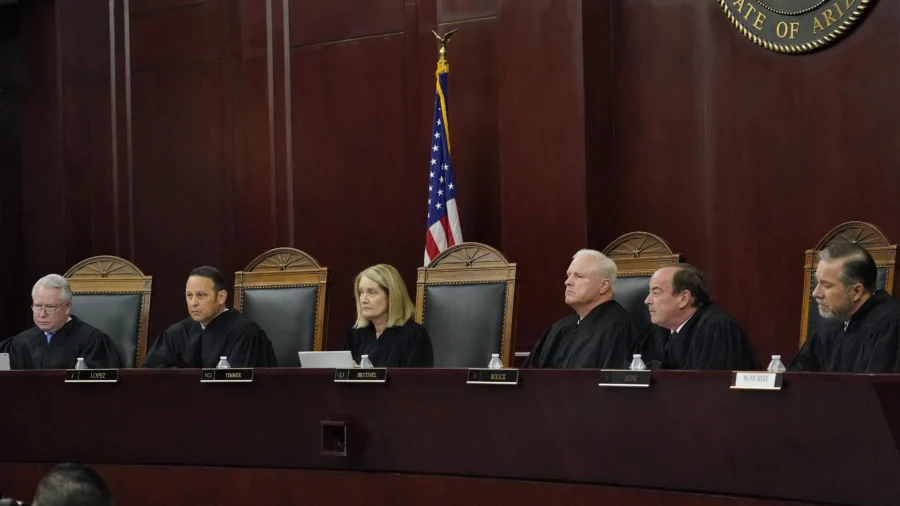A nearly two-year legal battle over abortion in Arizona ended on April 9 with the state Supreme Court’s ruling that a pre-statehood ban on most abortions is legally enforceable in the state.
The 1864 law bans all abortions in Arizona, save those performed to save the life of the mother.
The 4–2 ruling reverses a lower court’s opinion that a 15-week abortion limit passed in 2022 supersedes the older law’s abortion restrictions. The Arizona Court of Appeals had held that the two laws could be “harmonized,” allowing doctors to perform abortions up to 15 weeks, but also permitting the prosecution of non-physicians who perform abortions in the state.
“We conclude that [the 2022 law] does not create a right to, or otherwise provide independent statutory authority for, an abortion that repeals or restricts [the 1864 ban], but rather is predicated entirely on the existence of a federal constitutional right to an abortion since disclaimed by Dobbs v. Jackson Women’s Health Organization,” the court wrote in its majority opinion.
“Absent the federal constitutional abortion right, and because [the 2022 law] does not independently authorize abortion, there is no provision in federal or state law prohibiting [the 1864 ban’s] operation,” the court added, holding that the ban is now enforceable.
The law is slated to take effect on April 23.
Arizona was one of several states thrown into turmoil by the U.S. Supreme Court’s June 2022 Dobbs decision overturning Roe v. Wade. Upon Roe’s reversal, the state’s then-Attorney General Mark Brnovich, a Republican, said the 1864 law should be enforced.
At the time, the law was permanently blocked due to a 1973 injunction that was granted in the wake of Roe. Mr. Brnovich filed a motion to lift the injunction, but attorneys representing Planned Parenthood of Arizona argued that the state’s more recent abortion laws—including the 15-week limit—suggested that the state’s lawmakers intended to allow greater access to abortion in the state than the Civil War-era law permits.
Pima County Superior Court Judge Kellie Johnson sided with the attorney general, ruling that the 1864 law could be enforced. The decision brought Arizona’s abortion industry to a halt for two weeks before the state’s Court of Appeals blocked the lower court’s ruling. Months later, in December 2023, the three-judge panel issued its “harmonized” ruling.
Arizona’s Democrat Gov. Katie Hobbs responded to the latest ruling with disdain.
“It is a dark day in Arizona,” she wrote on X, formerly Twitter. “We are just fourteen days away from one of the most extreme abortion bans in the country. But my message to Arizona women is this: I won’t rest, and I won’t stop fighting until we have secured the right to abortion. That is my promise to you.”
White House press secretary Karine Jean-Pierre likewise called the ban “extreme and dangerous,” while Rep. Juan Ciscomani (R-Ariz.) derided the court’s ruling as “a disaster for women and providers.”
“In Arizona, our 15 week law protected the rights of women and new life. It respected women and the difficult decision of ending a pregnancy – one I will never personally experience and won’t pretend to understand,” he said in a statement.
Touting his record as a “strong supporter of empowering women to make their own healthcare choices” and an opponent of a national abortion ban, the congressman called on Arizona’s state lawmakers to address the matter.
Meanwhile, others celebrated the court’s ruling as a victory for life.
“Life is a human right, and today’s decision allows the state to respect that right and fully protect life again—just as the legislature intended,” said Alliance Defending Freedom (ADF) Senior Counsel Jake Warner, who argued the case before the court.
“Life begins at conception. At just six weeks, unborn babies’ hearts begin to beat. At eight weeks, they have fingers and toes. And at 10 weeks, their unique fingerprints begin to form,” Mr. Warner noted.
“Arizona’s pro-life law has protected unborn children for over 100 years, and the people of Arizona, through their elected representatives, have repeatedly affirmed that law, including as recently as 2022. We celebrate the Arizona Supreme Court’s decision that allows the state’s pro-life law to again protect the lives of countless, innocent unborn children.”
The referenced ballot initiative slated for Arizona’s general election ballot would establish a constitutional right to abortion in the state up until the point of fetal viability, or the point at which a baby can survive outside of the womb.
The Arizona Supreme Court’s decision follows former President Donald Trump’s Monday announcement that he believes the legality of abortion should be decided by the states, not the federal government.
Kari Lake, Arizona’s Republican Senate candidate, echoed that stance Tuesday, holding that the 1864 ban was “out of step” with Arizonans on abortion.
“I wholeheartedly agree with President Trump — this is a very personal issue that should be determined by each individual state and her people,” she said in a statement. “I oppose today’s ruling, and I am calling on Katie Hobbs and the State Legislature to come up with an immediate common sense solution that Arizonans can support. Ultimately, Arizona voters will make the decision on the ballot come November.”
From The Epoch Times


